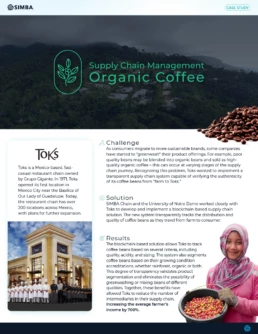Supply Chain Management for Organic Coffee
Toks is a Mexico-based, fast-casual restaurant chain owned by Grupo Gigante. In 1971, Toks opened its first location in Mexico City near the Basilica of Our Lady of Guadalupe. Today, the restaurant chain has over 200 locations across Mexico, with plans for further expansion.
Challenge
As consumers migrate to more sustainable brands, some companies have started to “greenwash” their product offerings. For example, poor quality beans may be blended into organic beans and sold as high-quality organic coffee – this can occur at varying stages of the supply chain journey. Recognizing this problem, Toks wanted to implement a transparent supply chain system capable of verifying the authenticity of its coffee beans from “farm to Toks.”
Solution
SIMBA Chain and the University of Notre Dame worked closely with Toks to develop and implement a blockchain-based supply chain solution. The new system transparently tracks the distribution and quality of coffee beans as they travel from farm to consumer.
Results
The blockchain-based solution allows Toks to track coffee beans based on several criteria, including quality, acidity, and sizing. The system also segments coffee beans based on their growing condition accreditations, whether rainforest, organic or both. This degree of transparency validates product segmentation and eliminates the possibility of greenwashing or mixing beans of different qualities. Together, these benefits have allowed Toks to reduce the number of intermediaries in their supply chain, increasing the average farmer’s income by 700%.
Challenge
As consumers migrate to more sustainable brands, some companies have started to “greenwash” their product offerings. For example, poor quality beans may be blended into organic beans and sold as high-quality organic coffee – this can occur at varying stages of the supply chain journey. Recognizing this problem, Toks wanted to implement a transparent supply chain system capable of verifying the authenticity of its coffee beans from “farm to Toks.”
Solution
SIMBA Chain and the University of Notre Dame worked closely with Toks to develop and implement a blockchain-based supply chain solution. The new system transparently tracks the distribution and quality of coffee beans as they travel from farm to consumer.
Results
The blockchain-based solution allows Toks to track coffee beans based on several criteria, including quality, acidity, and sizing. The system also segments coffee beans based on their growing condition accreditations, whether rainforest, organic or both. This degree of transparency validates product segmentation and eliminates the possibility of greenwashing or mixing beans of different qualities. Together, these benefits have allowed Toks to reduce the number of intermediaries in their supply chain, increasing the average farmer’s income by 700%.
Toks
It is important that we authenticate, track, and trace every bag by farmer, coffee grade, and production dates. SIMBA Chain’s smart contract solution will help Toks maintain the high quality our customers expect and enjoyGustavo Pérez Berlanga. Senior VP of Sustainability and Social Responsibility for Toks Restaurant Group
Although many coffee providers are looking to deliver better quality beans and showcase their sustainability measures, few have adopted the necessary practices. According to a recent report, only one-third of companies have tangible plans for sustainability, and less than 1% (0.6%) integrate blockchain technology. Recognizing these shortcomings, Toks set out to implement a tangible, measurable, and transparent solution.
Toks works directly with cooperatives of small Mexico-based coffee farmers, reflecting its commitment to sustainable practices. As a rapidly growing restaurant chain, Toks was also looking to implement a supply chain solution capable of bringing transparency and quality assurance to these close-knit relationships—and to deliver the best cup of coffee to their customers.
However, the complexity of coffee beans supply chains necessitated a robust system capable of tracing how coffee beans are grown, harvested, graded, deshelled, roasted, and shipped to each restaurant. In search of innovative solutions, Toks turned to SIMBA Chain and the University of Notre Dame to pilot a supply chain platform built using blockchain-based smart contracts.
Senior VP of sustainability and social responsibility for Toks Restaurant Group, Gustavo Pérez Berlanga, worked closely with SIMBA Chain during the implementation process. “It is important that we authenticate, track, and trace every bag by farmer, coffee grade, and production dates. SIMBA Chain’s smart contract solution will help Toks maintain the high quality our customers expect and enjoy,” said Pérez Berlanga when speaking on the need for supply chain transparency.
